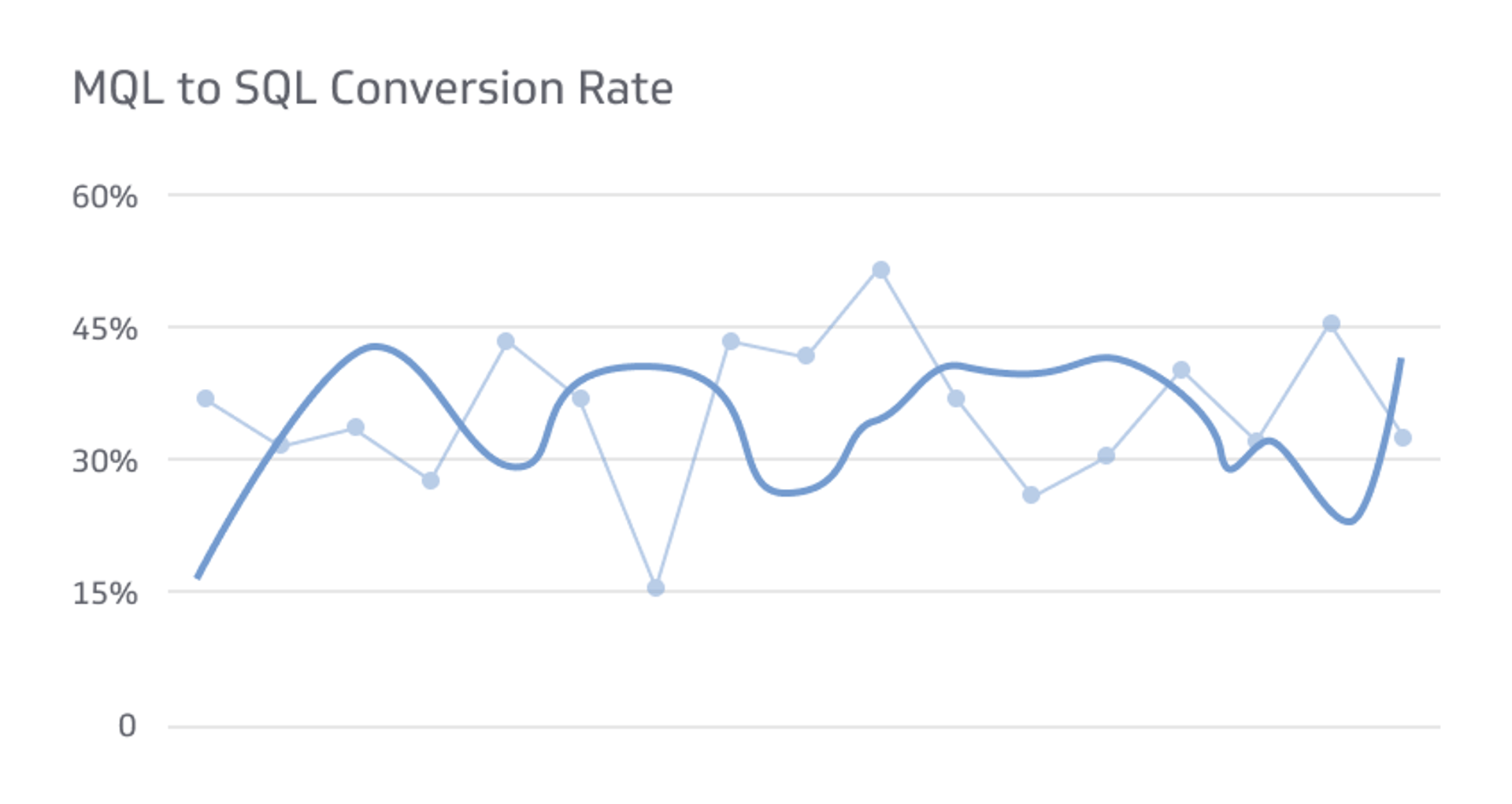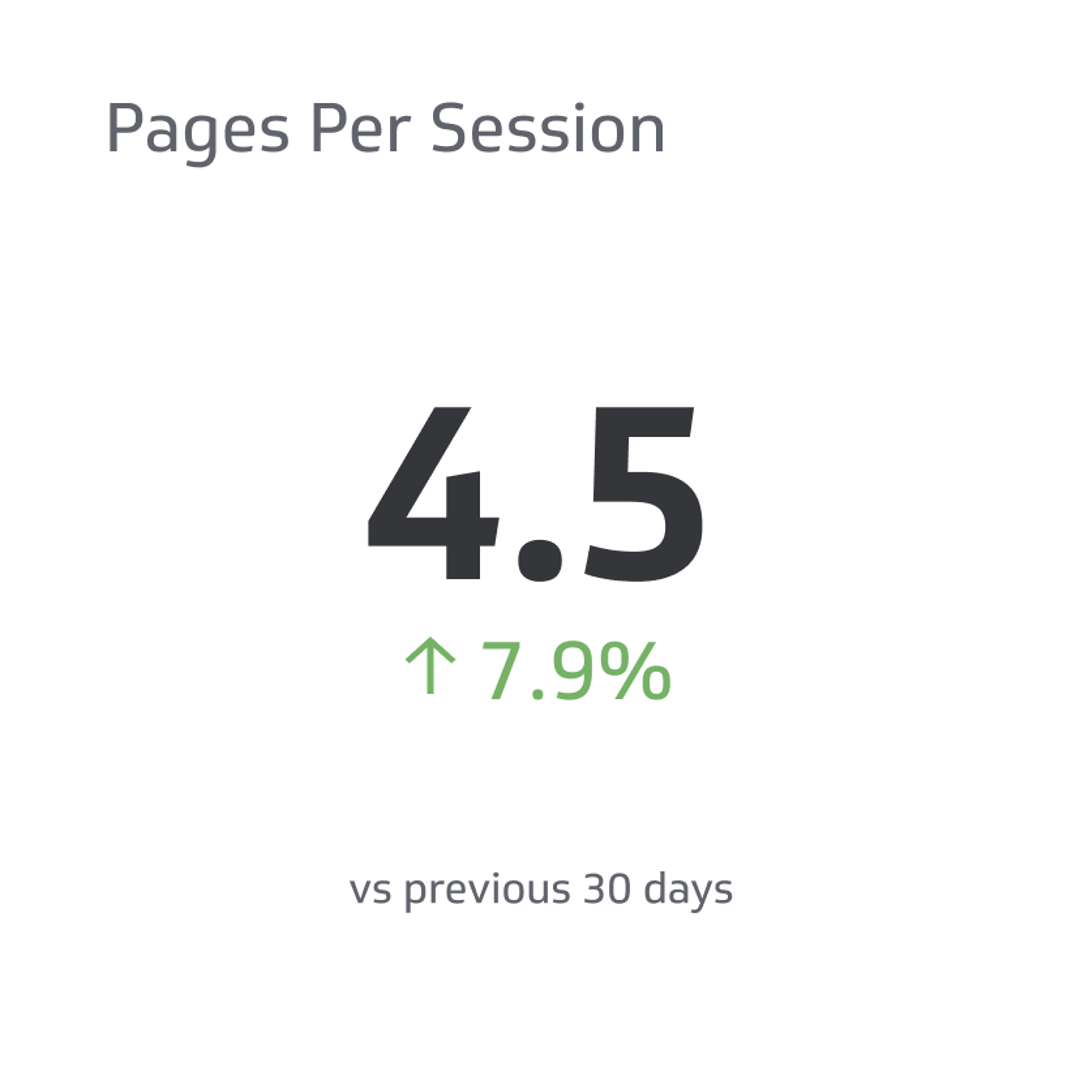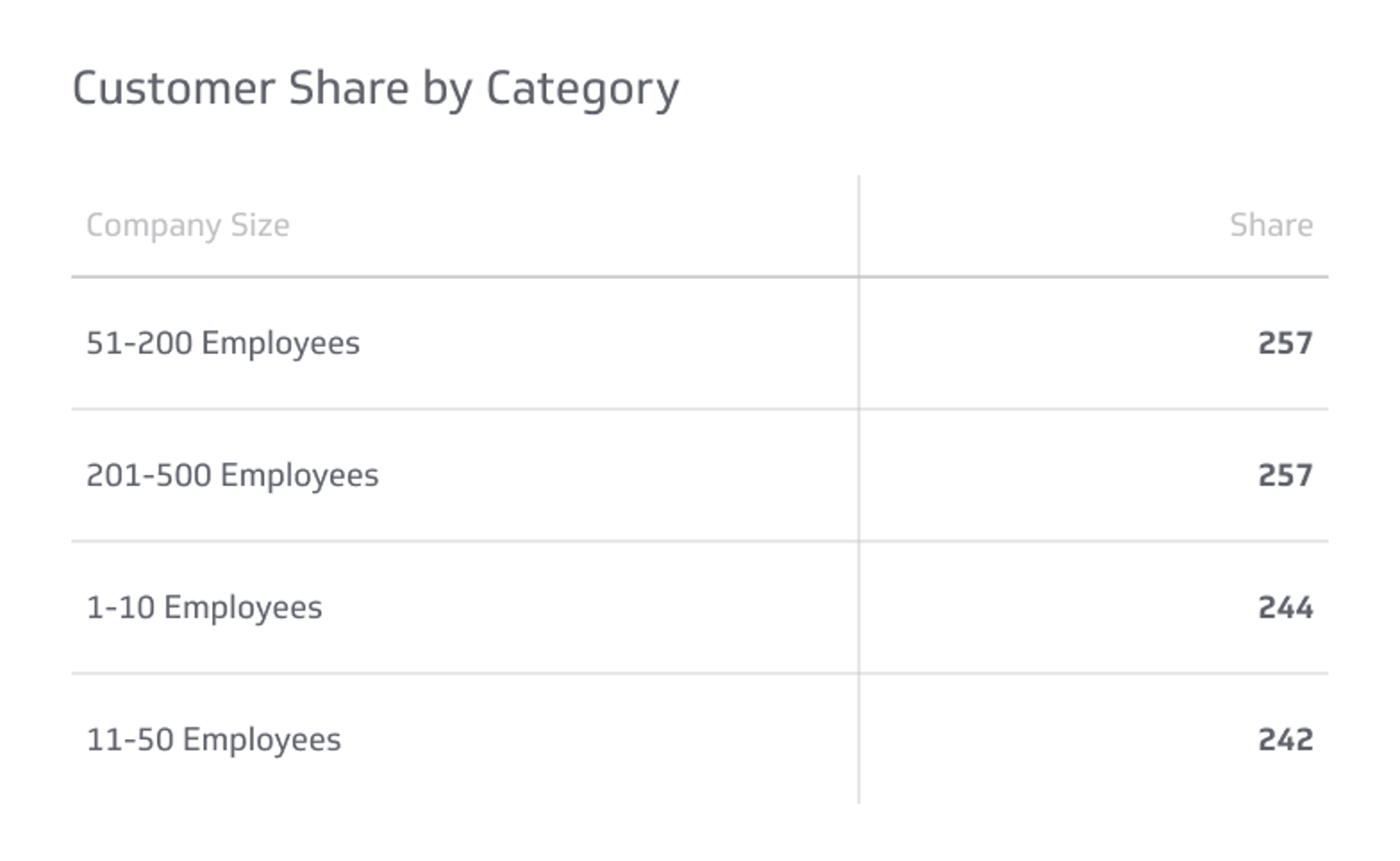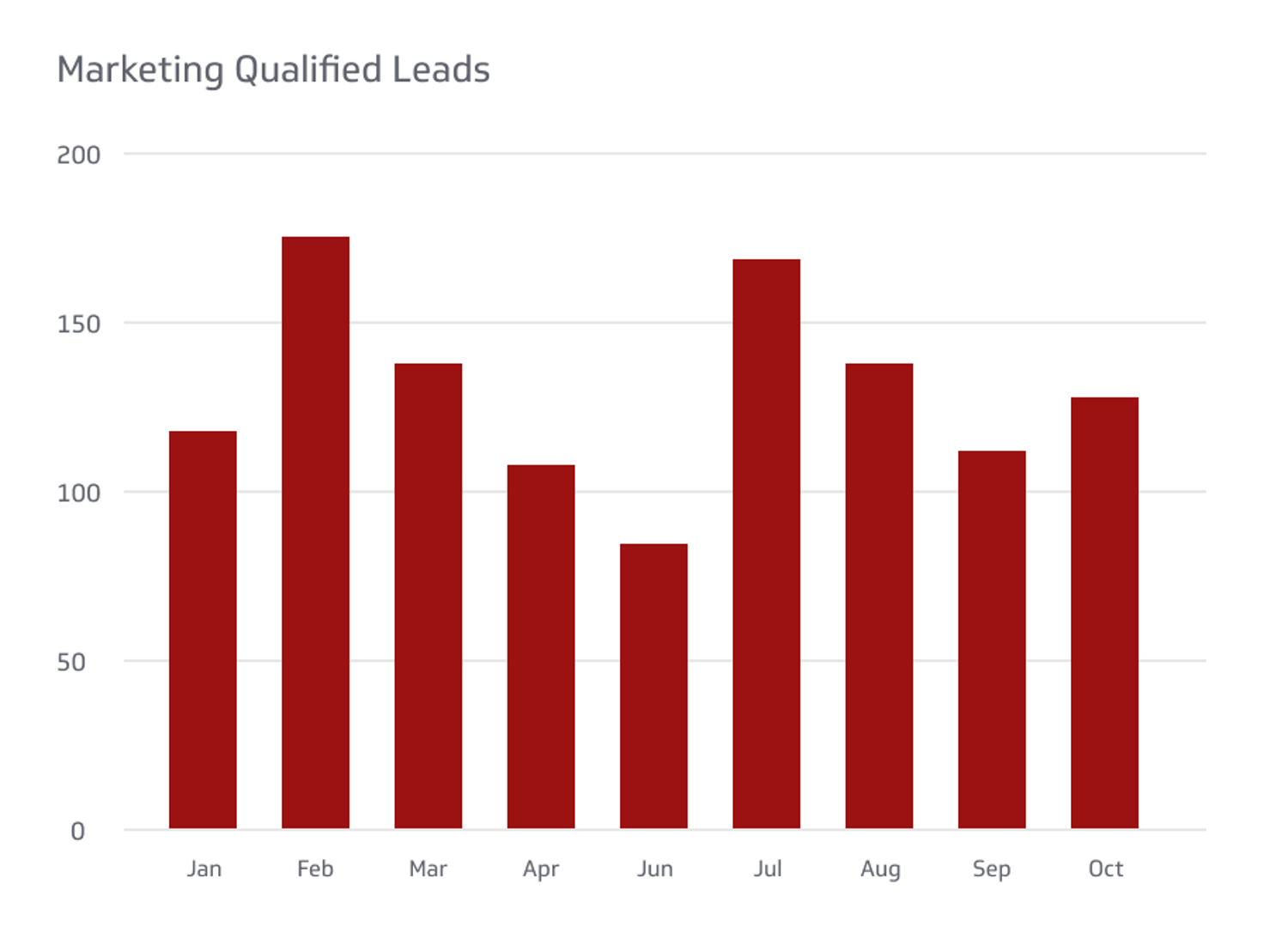MQL to SQL Conversion Rate
This metric provides valuable insights for boosting revenue and customer acquisition.
Track all your Digital Marketing KPIs in one place
Sign up for free and start making decisions for your business with confidence.

In today's competitive business landscape, companies constantly strive to improve their sales performance and drive growth. One critical metric that can help measure the effectiveness of your marketing and sales efforts is the MQL to SQL conversion rate.
This conversion rate tracks the percentage of marketing-qualified leads (MQLs) that become sales-qualified leads (SQLs), providing valuable insights for boosting revenue and customer acquisition.
In this article, we'll dive into the importance of MQL to SQL conversion rate in optimizing your sales, discuss strategies for improvement, and explore factors affecting the conversion rate.
What Is MQL to SQL Conversion Rate
A marketing-qualified lead (MQL) refers to a prospect showing interest in your brand or products, typically through online interactions such as downloading an eBook or signing up for a webinar.
On the other hand, a sales-qualified lead (SQL) is a lead that has demonstrated strong buying intent and meets specific criteria set by your sales team, making them more likely to convert into paying customers.
The MQL to SQL conversion rate is a metric that measures the effectiveness of the lead qualification process in transitioning leads from the marketing stage (MQL) to the sales stage (SQL). It represents the percentage of MQLs that successfully convert into SQLs.
The conversion rate can vary greatly depending on factors like industry, target market, and specific company lead generation strategies.
Here's how the calculation works:
MQL to SQL conversion rate = (Number of SQLs / Number of MQLs) x 100
For example, if the company has 100 MQLs and 30 of them become SQLs, the conversion rate will be:
(30 / 100) x 100 = 30%
A higher conversion rate indicates a more efficient lead qualification process, where a larger proportion of MQLs are successfully identified as SQLs and passed on to the sales team.
Understanding these two terms allows businesses to nurture and manage their prospects throughout their buyer journey while ensuring efficient collaboration between their marketing and sales teams.
Importance of Conversion Rate Benchmark
The industry-wide consensus for the average MQL to SQL conversion rate is 13%, an essential starting point for businesses to measure their success in converting MQLs to SQLs.
For instance, a business with a 5% MQL to SQL conversion rate indicates significant room for improvement in its lead nurturing process.
On the other hand, if they boast an impressive 20% conversion rate, it highlights that their marketing and sales strategies are particularly effective compared to the average benchmark.
Keeping track of this key digital marketing metric empowers companies by providing them with actionable insights on their performance in lead generation, prospect engagement, and ultimately closing deals—all pivotal factors within competitive sectors such as e-commerce or SAAS industries.
Factors Affecting Conversion Rate
Several factors can influence the MQL to SQL conversion rate, which businesses must understand and address to optimize this metric.
- Quality of leads: A major determinant is the quality of leads generated through marketing efforts. Targeting ideal buyer personas and attracting high-quality prospects will increase the likelihood of them converting into sales-qualified leads.
- Marketing and sales team collaboration: Another significant factor is the alignment between marketing and sales teams. Ineffective communication or misalignment of goals can hinder seamless transitions from MQLs to SQLs during handoffs, leading to lost opportunities.
- Lead scoring systems: Employing proper lead scoring systems also aids in identifying potential customers who are more likely to convert into qualified leads, allowing businesses to focus their resources on high-priority targets effectively.
Why Is MQL to SQL Conversion Rate Important?
It’s essential to understand the importance of MQL to SQL conversion rate and optimize your lead generation and sales processes.
Improving sales and marketing alignment
When the sales and marketing teams work cohesively, lead generation and nurturing become more effective.
This improves the quality of leads and reduces the likelihood of losing potential customers due to miscommunication between teams. Businesses can streamline their marketing efforts based on sales team feedback by aligning goals, strategies, messaging, and metrics.
For instance, the sales team can provide insights into what type of content or approach resonates with prospects at different stages of the buyer's journey which would help improve future campaigns.
Additionally, when both teams are aligned toward achieving common goals, they often take a more collaborative approach that fosters innovation resulting in new initiatives that could create new market opportunities.
Identifying areas for improvement in lead generation and nurturing
Analyzing the MQL to SQL conversion rate can help businesses identify areas for improvement in their lead generation and nurturing processes.
By looking at the data, companies can determine which marketing channels drive the most qualified leads and adjust their strategies accordingly.
In addition, evaluating how sales teams handle leads that come from marketing efforts can provide insight into where improvements may be needed.
Gaining insight into overall business growth
By analyzing the MQL to SQL conversion rate, you can identify areas for lead generation and nurturing improvement, gaining insight that could lead to overall business growth.
For example, if your MQL to SQL conversion rate is consistently low, it could indicate that your messaging and content aren't resonating with potential customers or that there is a disconnect between sales and marketing teams.
Properly evaluating this key point indicator (KPI) will help businesses make data-driven decisions about their marketing strategies, directly impacting lead generation efforts and resulting in customer acquisition and overall revenue growth.
How To Increase MQL to SQL Conversion Rate
Here are a few proven techniques and strategies to boost your MQL to SQL conversion rate, propelling your business toward greater lead generation and sales success.
Develop a clear and targeted lead generation strategy
A clear and targeted lead generation strategy involves identifying the ideal buyer persona, understanding their pain points, and creating content that resonates with them at each sales funnel stage.
For example, if you're selling SEO services, you may want to target businesses in specific industries or geographies more likely to need your services.
You could create blog posts or social media ads targeting these audiences and offering valuable insights on how they can improve their website's search engine rankings.
Personalize and tailor messaging to the buyer’s journey
Personalizing and tailoring messaging to the buyer's journey includes understanding where a lead is in their buying process, what they are looking for, and what messaging will resonate with them.
For example, if you target a customer in the awareness phase of their buyer's journey, it would be best to offer educational content such as guides or eBooks about industry trends or common customer pain points that your product or service can solve.
However, if you are targeting someone in the consideration stage of their journey, it would be more appropriate to share case studies or demo videos showing how your solution has helped similar customers in their situation.
On the other hand, if a lead has already engaged with your brand several times and is ready to make a purchase decision soon, sending more product-focused messaging might be appropriate.
By personalizing messaging throughout the entire buying process based on each lead's behavior and preferences, companies can create more effective marketing campaigns that increase MQL to SQL conversion rates while building stronger relationships with potential customers.
Use data and analytics to identify areas of improvement
By analyzing buyer behavior, lead generation channels, and sales funnel performance, businesses can identify bottlenecks or gaps that need to be addressed.
For instance, tracking website traffic sources through tools such as Google Analytics can reveal which channels generate more qualified leads.
This way, sales teams focus on high-quality leads most likely to convert into customers increasing conversion rates exponentially.
Implementing a lead scoring system
A lead scoring system allows you to prioritize leads based on their level of interest and engagement with your company.
Lead scoring involves assigning points based on criteria like demographic information, website behavior, email engagement, and social media interactions.
For example, if you run an e-commerce store selling sports equipment, you might assign higher scores to visitors who browse multiple pages in the basketball section or add items from that category to their cart.
Focusing your attention on high-scoring leads can save time and resources while increasing your chances of closing deals with those most likely to buy.
Collaborate and communicate effectively with sales and marketing teams
Effective collaboration and communication between the sales and marketing teams are vital to improving the MQL to SQL conversion rate. These two teams often work towards the same goal, but their approaches sometimes conflict.
When there is miscommunication between the two teams, it can result in missed opportunities and lost sales. To improve collaboration, companies should establish regular meetings between their sales and marketing departments to discuss targets, potential leads, campaign feedback, and other important information.
One way to communicate effectively is by establishing a service-level agreement (SLA) between the two teams. This document outlines each team's roles and responsibilities throughout the lead generation process—from lead capture to closing deals.
According to industry benchmarks, 13% is the average MQL to SQL conversion rate that companies should aim for.
However, businesses can significantly improve the conversion rate number by streamlining the handoff process between marketing and sales teams through collaboration strategies such as automation and analytics tracking software.
Companies should strive to create an environment where teamwork is encouraged across all levels of the organization while optimizing communication channels wherever possible to facilitate frequent interactions across different departments within their team structure.
Conclusion
Measuring the MQL to SQL conversion rate is crucial for any business looking to boost its sales performance.
Companies can improve their conversion rates and drive customer acquisition by understanding the factors that affect this metric and implementing best practices like a clear lead generation strategy and personalized messaging.
Related Metrics & KPIs



